The Giro enjoys a rest day in Brixen, deep in the German-speaking Tyrol area of Italy and once home to Pope Damasus II whose papal reign lasted just 23 days. A study in brevity but Steven Kruijswijk only needs to hang on for a matter of days to win his sacred contest and right now he is looking as sure as his shoulders. The Dutchman was milliseconds behind Alexander Foliforov’s surprise result yesterday but minutes ahead of some of his rivals, notably Vincenzo Nibali who climbed up the Alpe di Siusi only to fall down the overall classification. Interrogated how he felt yesterday Nibali replied in a word that doesn’t need translation: “demoralizzato“.
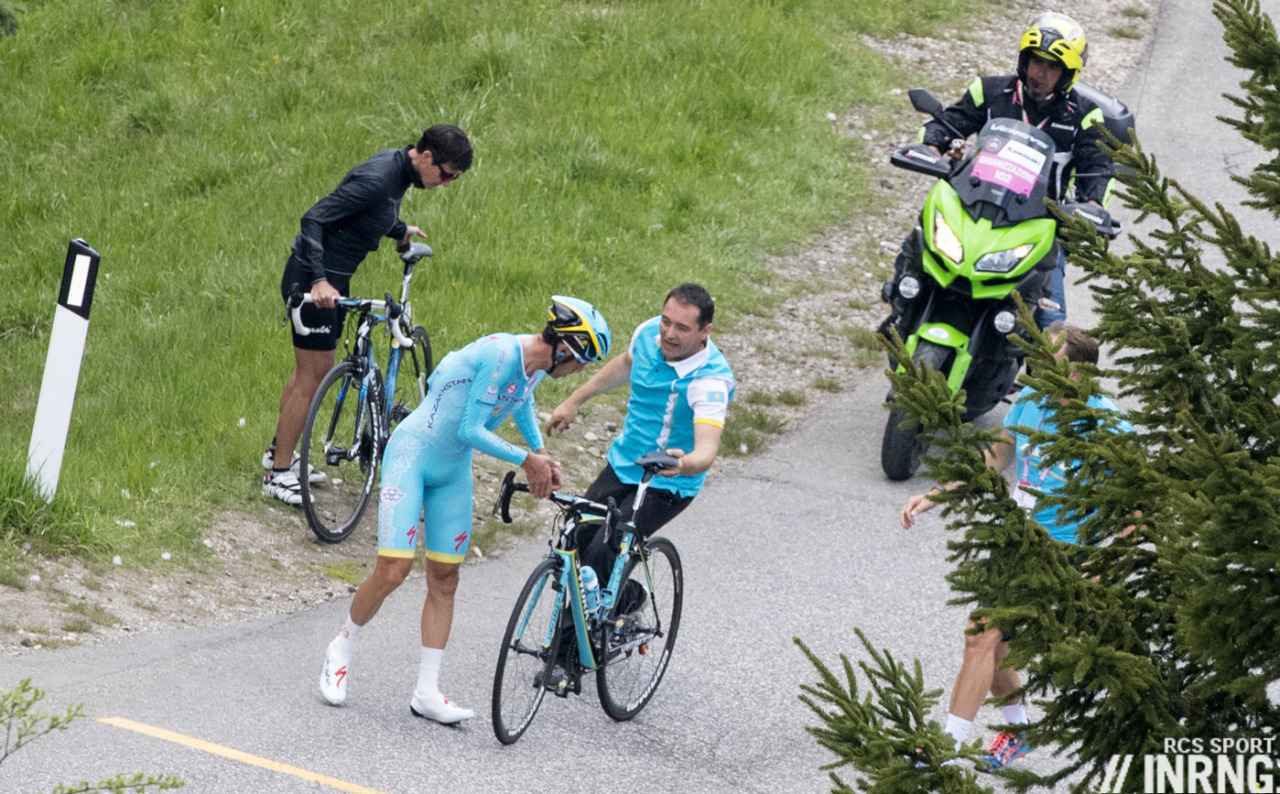
If the legs haven’t been working then yesterday saw things go from bad to worse. Nibali broke his bike and lashed out at an exuberant fan during yesterday’s stage; he was losing time before the problems but these were symbolic moments. Even is bike and sections of the tifosi are letting him down.
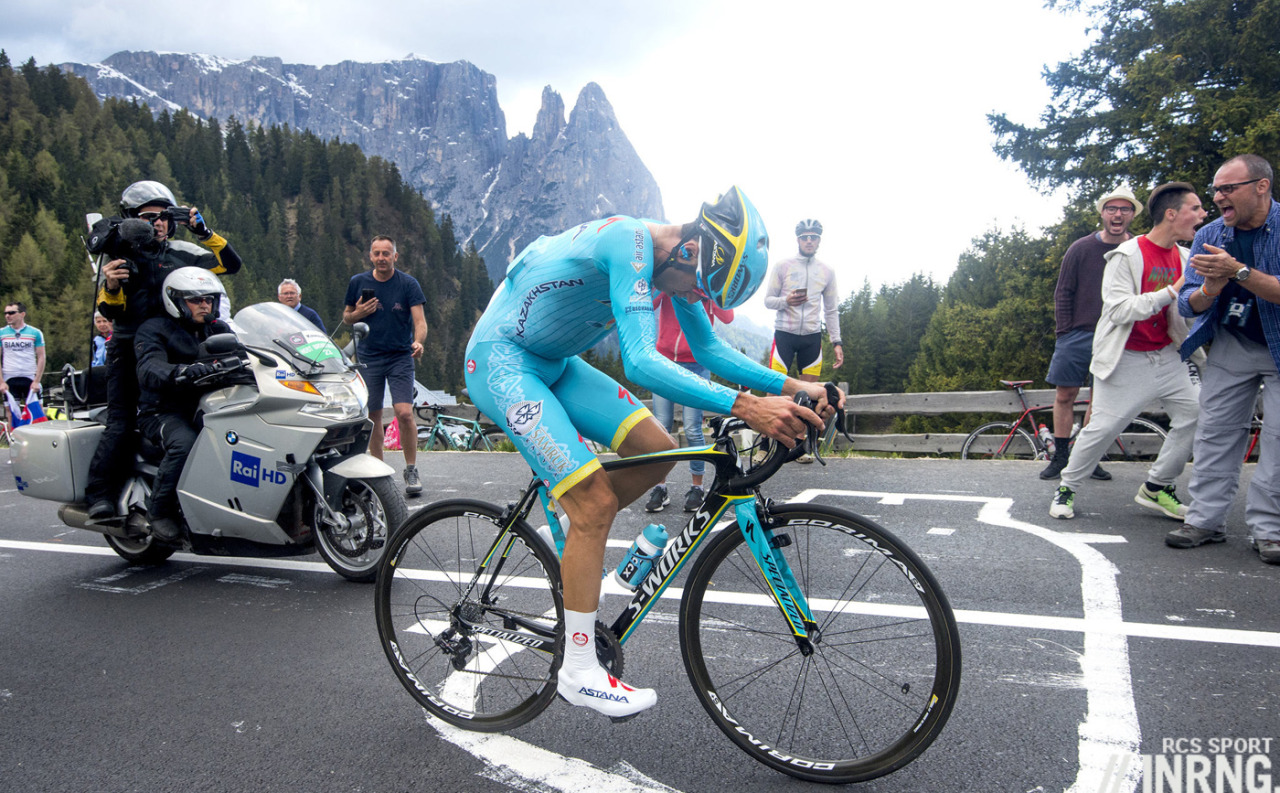
Maurice De Muer, manager of Luis Ocaña and a man who knew a thing or two about cycling, defined a champion as someone who was capable of acting alone to turn around a bad situation to their advantage. Nibali has met the definition in the past but like all risk-takers for every winning move their are forgotten failures too. Right now he doesn’t seem to have the legs and increasingly his mind seems to be accepting this. Stage after stage La Gazzetta Dello Sport retorts that Nibali might not have had a good day but there are chances to seize, that a battle lost does not mean the war is over. But Nibali’s collected too many bad days and has never looked in command. This time last week he was two seconds behind Kruijswijk, now he’s two minutes down.

If he wants to turn around his 2m51s deficit on the overall classification he’ll have to take a big gamble with a long range attack, for example going clear on the Colle d’Agnello, exploiting the descent to take time and then pushing on to the summit finish in Risoul, all while Kruijswijk is left floundering without team mates. This sounds more like a gambit from Pro Cycling Manager than reality. If Mikel Landa was in the lead then the race could look locked down for the week with Team Sky in control but with Kruijswijk things don’t look quite so secure. Two minutes is a comfortable lead after faultless rising so far but easy to lose given the stages ahead.
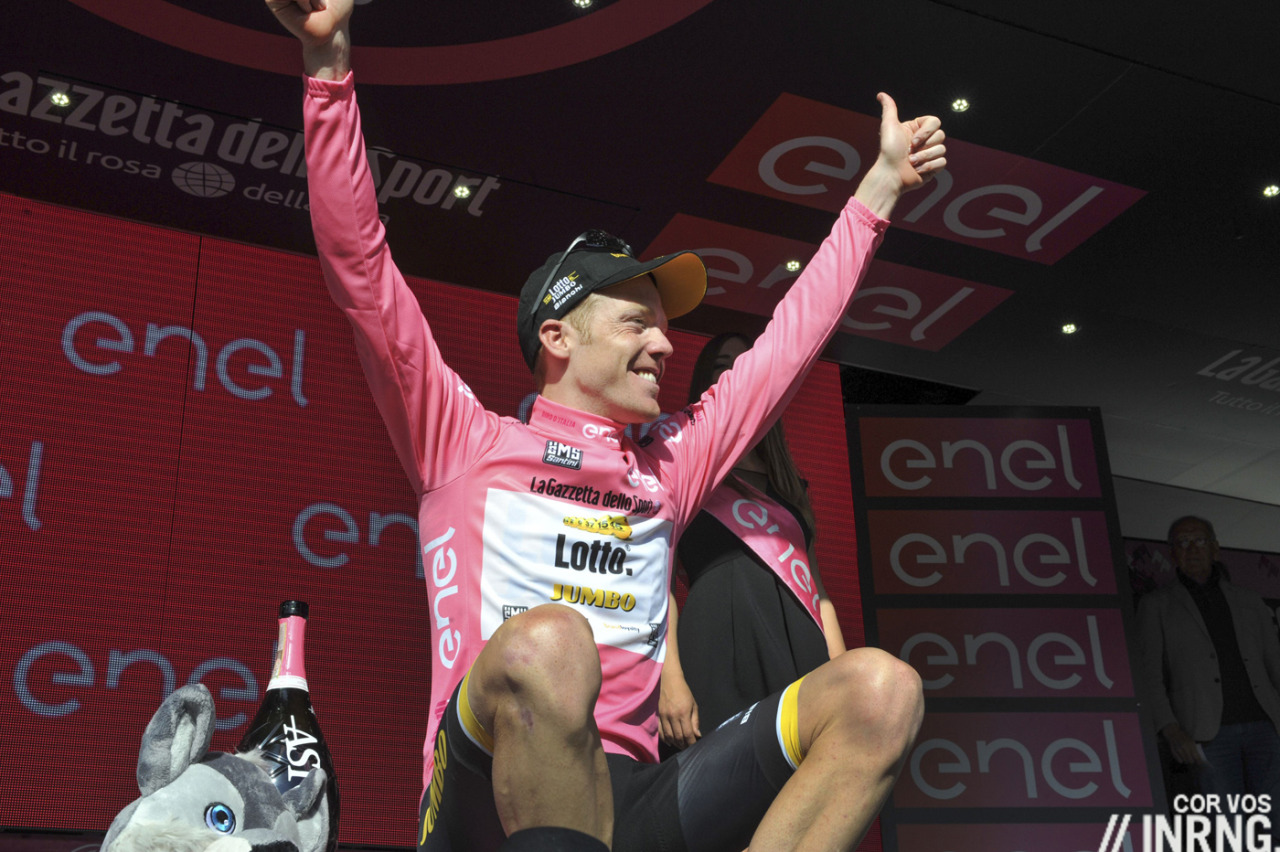
Kruijswijk can take comfort from the desperation of his rivals. Today’s press is warms up the idea of an alliance between Movistar and Astana. As a rule whenever you hear talk of “alliances” ventured as a tactical solution you should read this as a sign of desperation bordering on condemnation. Cycling is all about collusion – see Chaves and Kruijswijk’s collaboration to Corvara – but scenarios involving two losing teams conspiring to overturn the race leader are rare bordering on fantasy. It can be done on paper but the reality is far more circumspect because Astana and Movistar are rival outfits, both would love topple Kruijswijk but each wants the other to do the heavy lifting.
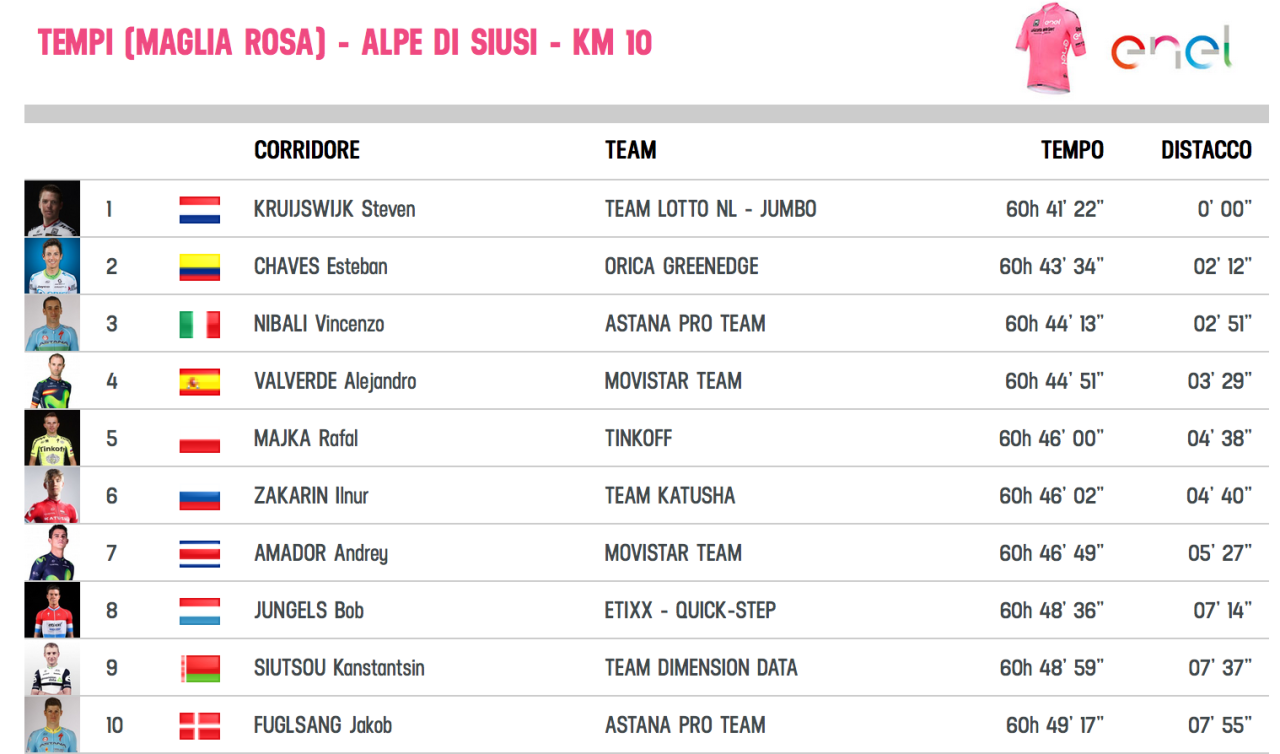
Nibali’s got the attention so far because of his stature and his ambitions, for him being third overall probably devalues his palmarès rather than ennobles and he’s arguably the only challenger to Kruijswijk who will come out better for trying and failing spectacularly than sitting tight and defending the bottom step of the podium in Turin. Esteban Chaves is bound to try an attack or two but taking back two minutes is a big ask and surely Orica-Greenedge crave a podium finish. Alejandro Valverde is in a hard place too, unless he’s been ill and this has been kept quiet it’s hard to see him profiting from the high altitude to come, his weakness in this race and past Tour de France challenges.
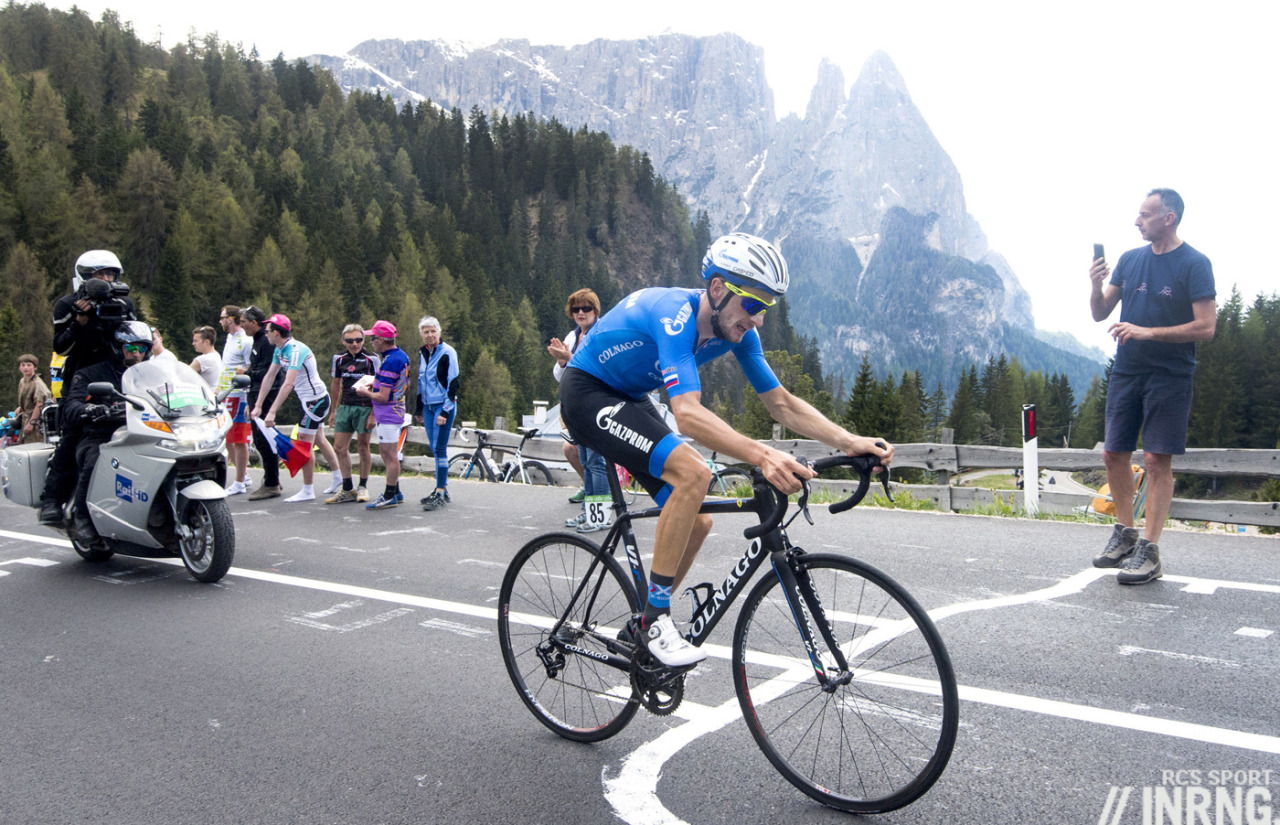
A word on Alexander Foliforov’s shock win which quickly became an exercise in story-telling. He’s a relatively unheralded rider, in fact all Russian riders have a stealthy media profile, an oddity in a sport where publicity and imagery make the wheels. Nationality was behind the chorus of suspicious and condemnatory comments, one of those moments that makes you fear for trial by jury – “the jury voted by majority that the Foliforov was guilty because he was Russian“. He’s shouldn’t be unknown given his consistency in the U23 ranks where he was among the best climbers in the toughest European races but all the same a mountain time trial win was surely unpredicted. It saves Gazprom-Rusvelo’s race, they’ve often missed out on the wildcard breaks which might be doomed but offer visibility.
The Other Jerseys
Come the third week and the ancillary contests often provide a contest once the overall classification has taken shape so a quick look at the standings and the maths behind them.

Giacomo Nizzolo leads the points competition ahead of Diego Ulissi as the pair compete on different fronts to take points. Stages 17 and 21 are flat sprinters days with 50 points on offer each time so the contest is tilted to Nizzolo but a sprint finish isn’t certainty given just how few teams have sprinters left in the race; many squads will hope a breakaway cannot be brought back. Ulissi meanwhile can hope for a third stage success but the hillier days where he thrives offer fewer points.
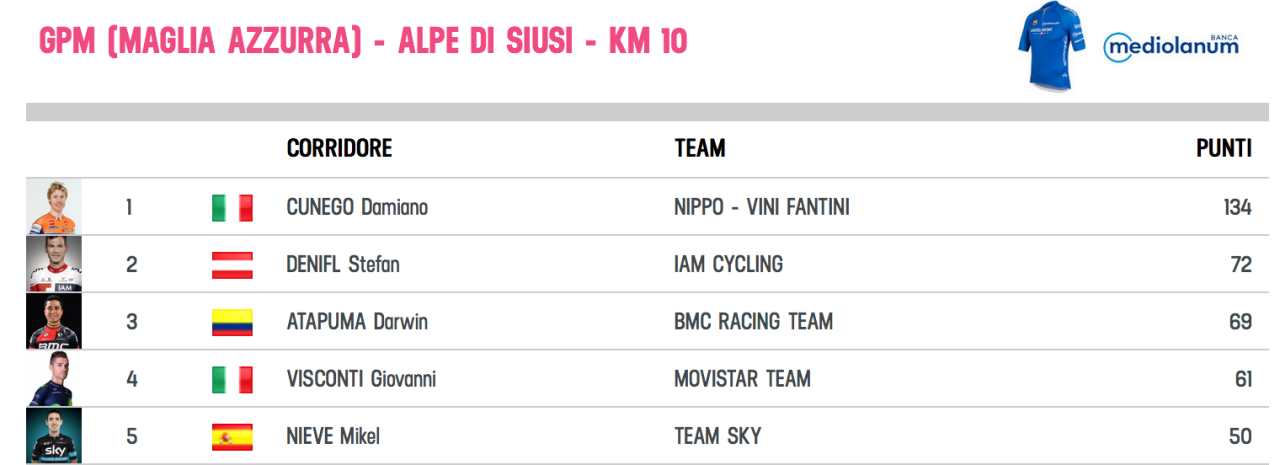
Damiano Cunego‘s built a big lead in the mountains competition but the big climbs have yet to come. The upcoming first category climbs offer 32, 20, 14, 10, 7, 4, 2, 1 points to the first eight while the Cima Coppi on the Colle dell’Agnello during Stage offers 40, 28, 21, 15, 10, 7, 4, 2, 1 points. Cunego can secure the jersey by getting in a breakaway on Friday or Saturday and treating the mid-stage mountain passes as his finish line.
 https://inrng.com/wp-admin/post.php?post=28669&action=edit
https://inrng.com/wp-admin/post.php?post=28669&action=edit
Bob Jungels has had a great Giro and his career prospects look bright. Sebastian Henao is 11 minutes back, a long way but he’s far better suited to the high mountains.
Will it snow?
Yes is the short answer but there’s time for things to improve again. The two key passes, the Agnello (2744m) and the Bonette (2715m) were cleared of their white winter coats last week but the problem is what is yet to come. Snow is forecast above 2,200m from this evening onwards but things are forecast to improve again, hopefully in time for the race. RCS have alternative routes with talk of the Col de Montgenèvre as the crossing point between France and Italy at “just” 1860m above sea level and a finish in Sestriere.
Conclusion
Only Steven Kruijswijk can beat Steven Kruijswijk, it’ll take a mistake or a jours sans for the pink jersey to get plucked off his angular shoulders. In the space of a week he has put minutes into his rivals and has yet to show a weakness. He is a surprise leader but has ridden the perfect race so far while a cast of pretenders from Landa to Hesjedal, Péraud to Urán, have not just lost time but lost their way. Yet just as the weather looks hard to predict, so could the rest of the race. Nibali and Italy will hope so.

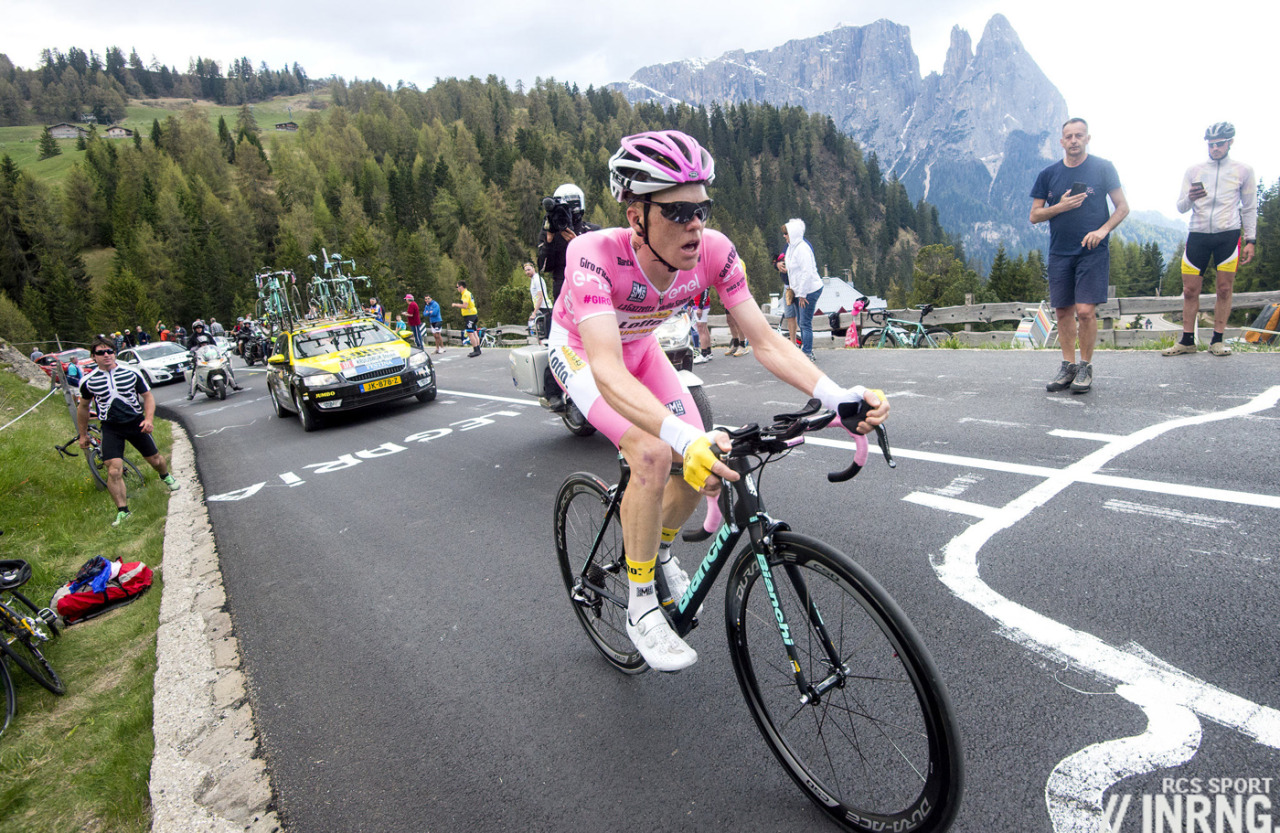
Repeating some of what I just wrote on the last blog, I don’t think Kruijswijk’s team’s relative weakness is going to be too big a factor. They can take care of him on the flat and Astana’s tactic of riding as a train uphill isn’t going to result in him being dropped, in all probability.
Nibali and Chaves are going to have to attack at every opportunity – especially when going downhill. That possibly means stages 16 and 18, as well as 19 and 20.
Nibali will have to go long and hope to make significant gains on the downhills – he’ll be praying for rain. I can’t see it being too likely to be successful, but as you say, the good news is that he’s unlikely to not risk coming 2nd or 3rd.
Can’t see Movistar helping Nibali much – Valverde would still have to beat Nibali – but then Movistar do love a podium.
At least RCS have alternative routes that they deem acceptable this time.
I think Visconti will challenge for the mountains classification and Ulissi could join breakaways and take intermediate sprints – plus stage 18 looks like one he could win.
Movistar would like to podium..so i can only see them letting Nibali have his attacks – knowing that any failure would be the perfect springboard for Valverde to counter-attack and gain time similar to Dumoulin on stage 6. Although I would hope Nibbles will be able to attack more than 50m this time!
Valverde jumping past Nibali on the GC as a result of Nibali trying something and failing, and Valverde doing jack all, would be entirely fitting!
Hee hee – so true.
Valverde is riding for his career, while you guys are just thinking of the race at hand. Although he has had a completely different set of circumstances, his story is a lot like Polidor’s; he’s most famous for not doing as well as everyone would like. Yet, look at his palmares.
Should be a good 3rd week of an already exciting Giro. I think Majka might be able to make the podium with Nibali and Valverde both looking vulnerable.
Also,
“It can be done on paper but the reality is far more circumspect because Astana and Movistar are rival outfits, both would love topple Nibali but each wants the other to do the heavy lifting.?”
Should this read “both would love to topple Kruijswijk”?
Yes for Kruijswijk, probably the fingers running scared of having to type Kruijswijk again 😉
Didn’t even try to type it myself, just copy and paste!
on the Gazprom Rusvelo debate I can see both sides of the coin. It would be in keeping with known problems with the sport that they have been disproportionately punished where other more established teams have been let off the hook. Also it would entirely normal in the cut and thrust for such a team to be prevented from getting into breaks by more established teams… Like I say I have mixed feelings about this but this could and I emphasise the word could, be an explanation as to why they did so well in a mountain tt having been relatively invisible in regular mountain stages.
I know what you mean but that’s rather my point, on either side of this story we’re left trying to work out which story is the most plausible without much detail (performance data, passport values etc).
Another aspect is that it’s not just the general issue of the scale of recent Russian doping problems – which are undiminished by the existence of problems elsewhere – but the specific issue of Gazprom’s own spate of positives a few years over the last few years. Both factors case a shadow on Foliforov’s emergence.
Meh..
Most athletes dope, it’s what they do. It astounds me that this is such a hard concept for most fans to grasp.
Most politicians and lawyers lie.
Rusvelo had 4 positive tests in 2013, another positive last year, also in 2013 two of their riders left behind a whole pharmacy of blood-related supplements in a house in America, along with an illegal IV kit. Through the Russian Global Cycling Project they’re essentially a state-backed team from a country with a well known state-sanctioned doping problem.
Given all that, I don’t think they can complain about unfair scrutiny.
Granted, but I’d find it odd if they had aytempted to/ been able to tailor any doping specifically in time for this stage. Guy was over an hour down going into the TT. Are we to believe he’s been doped to the gills but holding back for two weeks? Same goes for use of a motor.
Eh?
David, are you aware of blood doping practices? It isn’t beyond the realms of possibility that a quick half bag or a micro-dose of EPO could have been administered overnight.
Anyway, we shall have to wait and see. Foliforov did get an excellent result in an uphill ITT in Sochi too!!
I hate writing like this, but for decades the Russians have had a state-required doping programme for their athletes under duress and whatever else, yet the powers that be still try to deny it despite a mountain of evidence. Every trick in the book, physically and politically has been used in the least few months.
It stinks, and will continue to stink until the Kremlin admit what they’ve been doing. I’m not holding my breath.
Remember Canadian Ben Johnson and the 1980s? How about Ryder Hesjedal and the 20teens? Cute little Canada..
It’s not difficult to concoct a picture, fantastic or not.
What was interesting about Gazprom is that half of them went like trains yesterday. It was not just the winner. And just for good measure the last finisher yesterday was – Gazprom.
That last man on the stage, Ershov, makes for a nice symmetry but maybe a convenient result to take away an otherwise blinding gloss, showing Gazprom were slow as well as quick. He was one of the first men to start and the last at the finish. He was 10 minutes adrift of the winner and 3 minutes adrift of everyone else in the stage. That was mighty slow going in this scheme of things. The rider to whom he was minutemen took 6 and half minutes out of him. And one more for the conspiracy theory: the next to last man in against the clock was Porsev- of Katusha.
I wrote that article about what they left behind a few years ago. Took bleeding ages to figure out what those drugs were.
The two riders were let go at the end of the season.
https://inthedrops.net/2013/08/03/what-the-russians-left-behind/
“in 2013 two of their riders left behind a whole pharmacy of blood-related supplements in a house in America”. Never ever heard THAT one; can you elaborate / provide a link?
I know I’ve said it before but I do love the Giro. The leader of the race has a relatively narrow lead and doesn’t have mega team around him to carry him to within 1k of the finish on all the mountain stages. If he wants to win he’ll have to do it himself and he is open to a good old fashioned ambush. The mountains classification is being treated as a competition in its own right with riders who actually want to win it, rather that it being accidentally picked up by the GC winner. The points classification whilst being damaged by its leader leaving the race twice is still close and can be won by two riders trying to win it in different ways. All in all, a good week to come.
On Gazprom-Rusvelo not getting in breaks. Gazprom is, I think, the wealthiest company in the world. Does it need its riders to get in breakaways just for the sake of TV exposure in the same way a team sponsored by an Italian ice cream manufacturer or winery does?!
Yes, I wish the Tour would drop the extreme weighting of HC MTFs for the polka dot jersey. On stages (or indeed races) where not much is happening in GC it’s nice to have those ding-dong breakaway battles to mop up points like Voeckler and Kessiakoff had in 2012, or Charteau and Moreau in 2010.
+1
It’s also due to the TDF’s mania about HC mountain top finishes, whereas the Giro seems to put the biggest climbs earlier in the stage finishing on smaller category ones or even flat finishes. I expect more cases like Froome last year when the winner also takes the mountain prize as with the devaluation of time trials the TDF GC is effectively a mountains classification.
Even the Tour will have to rethink that soon, as there’s only so long the KoM jersey sponsor will be content to miss out on the final podium pictures because the KoM is wearing yellow instead.
+1 I wanted a close Giro win by Nibali…it could still happen and be even better when the champion overcomes the adversity to win. But at this point Kruijswijk or Chaves would also be worthy winners if The Shark proves not up to the task. As others have pointed out, Nibali gains little if he fails to win so he should win or go down in flames trying! W Il Giro!
Tour vs Giro is always an interesting debate. It’s rare to have a Giro that isn’t more interesting to watch than the Tour – but is that a natural by-product of the stakes? It’s rare to have a great world cup final match because usually both sides are desperate to not lose; the buccaneering creative stuff happens early doors. So it is with the Giro – whereas (like it or not) TdF winner is shorthand in the popular view for ‘best cyclist in the world’, leading to defensive snooze-fests, the Giro has a lower profile and therefore more risks can be taken and, with a weaker field, smaller teams and lower-profile riders will fancy a bash. Which is what we’re seeing.
One other factor that makes the unholy alliance between Astana and Movistar even more unlikely is their close standings in the Team classification; it always seems to be an accolade that Movistar, in particular, vie for.
Having said that, therefore, they could send riders up the road and have an Amador / Valverde juncture.
Likewise, Astana are always inventive and aggressive in their tactical approach.
The Human Coathanger to be hung out to dry / taken to the cleaners etc etc..?
It’s been a fantastic race so far, with the overall title only just beginning to come into focus now – so credit the organisers.
Agree as well with Richard S above on the Mountains jersey working out as a competition in its own right. Great stuff.
As Trek has now lost Hesjedal, I guess they’ll go all in for Nizzolo on the sprint stages? So he’ll probably take the Points jersey.
Those climbs over 2700m look terrifying.
As a (very) long term cyclist and cycle sport fan, I just can’t warm to Nibali. It’s the ‘toys out of the pram’ thing, combined with more hype than reality maybe.
Fair enough, but I don’t understand why “As a (very) long term cyclist and cycle sport fan, ” should make any difference in your opinion of Nibali. The man has won all three Grand Tours plus a monument and entertains this “(very) long term cyclist and cycle sport fan” with his “never say die” attitude as one who tries to win rather than trying not to lose. All that will be severely tested over the next week as we see if The Shark can measure up to maybe his biggest challenge so far?
Problems with Nibali is that he complains too much and it’s always somebody else’s fault.
Also, apart from taking the Red jersey off the shoulder of poor old J-Rod in a time-trail during his first Vaulta win, he never actually had a successful “come back” in a Grand Tours. He either dominates or explodes.
He did make some dashing moves in week long stage races to get into leader’s jersey or win it eventually (eg. the 2013 T-A). But for those races, he was never under the pressure to win. More often than not, he was able to make those crazy moves precisely because he’s given up on GC and was stage hunting.
I’d say that last Tour was a case of “come back”, even if not “successful” as in “winning the yellow jersey”. And I wouldn’t say they let him go since he wasn’t anymore fighting for GC. People were quite nervous about that move, even when it later became clear that it wasn’t going to turn the race upside-down.
In 2010 he had a hard day on the Zoncolan (3′ down), due to the huge effort in the previous Asolo stage, then he came back strong after the rest day to perform really well on Plan de Corones (uphill ITT on Tuesday) and even better towards Aprica. He suffered a little on the Tonale stage but he was strong again for the ITT on the penultimate day. The final podium can be considered “successful” not only because he was quite young but also because he was there as a helper for Basso, who eventually won the race.
In 2011 he was suffering in the Dolomites (again), but that’s hard to interpret, because truth is that he went out on a long-range attack trying to go for the pink jersey overthrowing Contador rather defending himself. However he had just performed great on the Zoncolan, matching Contador himself, hence perhaps he wasn’t feeling great the following day, either. All in all, he lost more than 90″ to Contador and, crucially, Scarponi. Rest day, and he came back quite well on the uphill ITT on Tuesday. From then on, he performed consistently well with a so-and-so day in the penultimate stage to Sestriere. He didn’t win… but we saw a peculiar effect of “afterthought DSQ”: if it wasn’t for his *crazy* attack on Contador, he wouldn’t have risked losing time, and would have very probably been second, and thus first. Mind that I however consider Contador the legitimate winner of that Giro, but all this story makes it hard to say if Nibali’s Giro was successful or whatever. What’s sure is that he didn’t “explode” after his bad day.
That said, I get what you mean and, to a certain extent, I can even agree with the more general concept you express.
“it’s always somebody else’s fault”. I tend to agree, but that’s hardly unusual among top flight sportsmen (and top level performers in other fields). Confidence is extremely important, and much easier to maintain when your successes are down to your efforts, and your failures down to others’.
Really wondering why it’s Tyrol in English, not Tirol, which would be normal in any other language.
Guess the wrong pronouncation factor is near 95% then?
If there’s an opportunity for the English language to have an unnecessary letter in it, that opportunity will be taken.
kruijswijk has now an unbeatable opportunity to win a GT. He looks the strongest uphill and is normally good in the 3rd week.
What can go wrong? He has a weak team and we don’t know about his ability to manage pressure (at least I don’t).
From Nibali, I expect whether long range moves or/and abandon.
Chaves can maybe take profit of a jour sans of Kruijswijk, but I see him getting one easier than SK.
From Bala and his accolytes, I don’t expect much more than trying to secure a podium by riding against the former 2 in benefit of Kruijswijk.
Anybody else see Foliforov’s ITT result and think yeah right, what’s going on at Gazprom?
No. I think why are people come up with suspicions that never pay attention to Gazprom riders and their results except for one day at the Giro…..
Yes. It was a very common reaction.
Hopefully we see some action on the remaining mountain stages, though the incredibly long descents to the final climb don’t raise much hope of anything from long range. It’s like Vegni visited the mountain ranges in the wrong order.
Suspected that Gazprom-Rusvelo would take a stage win, though via Firsanov and not on Alpe di Siusi. Sickening to see the borderline xenophobia over Foliforov’s victory though.
Borderline xenophobia? I think the scepticism of Foliforov’s ride has very little to do with his ancestral background.
Any rational observer can look at this result and wonder how a second category professional, with no previous history of climbing faster than the world’s best climbers, can beat ALL OF THEM by 2-3+ seconds per kilometre. He didn’t just stay with the world’s best, he killed them.
Nibali must be thinking about his long term value and moving on from Astana…if he looks weak in this Giro he might lose out on a million euros in salary negotiations. I wonder what his agent would advise him to do – Risk his podium position with an all guns blazing attack for the win, or defend himself against Valverde and hope that Chaves and Kruijswijk have a bad day at some point. Pretty stressful position to be in I guess, not that I feel sorry for him, he gets paid enough.
I don’t think Nibali’s motivated by a big paycheck these days. He wants a team devoted to him to give him the best chance to win. I find it hard to believe his challenge for this Giro is anything other than winning the race. I wonder how many of the Italian contingent he’ll be able to take with him to the new petro-dollar funded team if he decides (as some say he’s already done) to move?
How could it happen that Nibali dropped his chain? Did he not use the campa eps which, to my understanding, makes it nearly impossible to drop his chain.
Nibali is using mechanical groupset.
http://www.cyclingnews.com/news/nibalis-specialized-tarmac-gets-new-paint-job-gallery
For those who like cyclist nicknames, but aren’t hugely fond of ‘human coathanger’, I saw in todays NRC (Dutch newspaper) that Kruijswijk is also called ‘De Kat van Nuenen’, which translates as ‘The Cat from Nuenen’.
It seems Esteban Cháves is not the favorite rider in the chat, but you must care of him =)
I also am surprised at the lack of attention paid to Esteban in the article and comments above. What I have found impressive particularly is how smartly he seems to be riding. He has no trouble matching moves but he tends to respond with a measured effort. And the time trial: it’s his weakest event, but he had the confidence to go slow out and finish fast, a sure sign of maintaining control and playing to his strengths. Whether he can gain enough time on Kruijswijk to win this Giro obviously depends 50% on Kruijswijk, but I for one am looking forward to watching that contest.
I think Esteban could still spoil Kruijswijk’s party. He’s been stronger (I think) for the most part in the mountains apart from the TT which was a pretty linear effort that suits Kruijswijk’s style.
Apart from the mountain TT when did Kruijswijk get most of his lead over Chavez?
Chaves is pure talent – and a very nice person, too.
I was following his career since the juvenile ranks and I was really shocked when the accident threatened his future as a pro rider. Nerve damage is pernicious and the chance of a proper and full recovery is often a big question mark.
I appreciated a lot the canny way he dropped Nibali… instead of eagerly getting back to Kruijswijk he started a progression from a relatively lower speed (“relatively” since it was more than enough to leave the rest of the contenders behind) and then launched a more brutal acceleration whe he was within shooting distance to try and drop Nibali – which he succeeded in doing – while getting the wheel of the Dutchman; whereas many times you’re taught to decelerate and recover before closing in, since the risk is that the rider you’re approaching is waiting for you to be close to prepare a further attack.
In this case, however, it was paramount for the success of the move to have Nibali dropped before anything else, and the risk of being attacked by Kruijswijk was reduced since he also had an interest in keeping Chaves along with him.
From our sofa it’s all very clear, but you must decide what’s best – in this case, against the more usual strategy you’ve been coached for! – in a few seconds and under heavy strain.
He obviously needs more experience and the accident hindered the progression of his career when compared to his – still very young – age (but that “rest year” might even become an “advantage” in the long term), but both the physical qualities and the cycling instinct are there, too.
What I hope is that they don’t make of him another “submarine” guy à la Aru, racing less and less outside the biggest races and avoiding to push or try anything in those few races they do without seeing them as a direct objective.
This year he arrived to May with less race days than when he was a 21 years old stagiaire. His “progression” in the last three seasons has been 26-20-16 race days, performing less and less, big goals aside: he went from making the odd top ten to the odd top-15 and now the odd top-20 in *one* stage of the stage races he entered in as a preparation for later months.
A rider like Nibali, who has been harshly criticised in Italy for racing and performing “less” than he was expected do usually enters May with some 25-30 days of racing, and even if the level of performance is really low, he tends to produce the occasional showing here and there, that is, he isn’t totally invisible like, say, Aru, has been in the first part of each and every season since 2014 on. I’m speaking of Aru (another great juvenile talent whom I appreciate) because, being Italian, is a known case, but Chaves has been even more invisible than the Sardinian in the last two seasons!
It’s a preparation-style which I really don’t like (compare that to Quintana, a rider who’s been unfairly accused of “disappearing” – by Nibali, among others 🙂 – while, on the contrary, he’s always been racing 25-30 days before May, and producing winning or top-level performances, too!).
I guess it’s a preparation which might be very effective, since, for example, one of the characteristics of the “new post-2011 Froome” is precisely the fact of being consistently averaging about 16 days of racing until May – at least, he throws in some good result, from time to time.
I think that’s something which could have unpleasant implications (if you are the conspiranoic type) but, what’s perhaps way worse, it hinders IMHO cycling as a whole, that idea of “meaningful narrative”, “season-long tale”, “repeated rivalries”. All very important factors which have been seriously weakened in modern cycling (thank you Lance): I just hope that Chaves won’t belong to this trend… and that Aru may change his ways. They’re young, after all, and it’s not a very promising thing for the new generations.
Interesting comments. My impression is that the Chaves progression since Orica took him on has been seriously designed for steady progress, and certainly it seems to have worked for Esteban – he is very appreciative of his team. And perhaps this Giro will be the beginning of a major ‘coming out’.
Sounds like Orica’s approach with him is adopted by his fans! They’re slowly developing him so he doesn’t feel too much pressure, the same as his fans’ are slowly developing their expectations and adoration of him so he doesn’t feel too much pressure too quickly!
I think he’s a huge talent and that Orica are doing a great job getting him and Caleb Ewan ready for the top races. It’d be great to see a Chaves/Quintana rivalry for the next 5-10 years.
Nice write up today, when you boil it all down there are only 3 stages to defend for the “Coat Hanger”, I like Nibali for being Nibali he is so very entertaining on and off of the bike, he wears his heart on his sleeve whilst trying desperately not to in public, if we look at the history of his time at Astana and the expectancy of the Tifosi i can see why it all weighs so heavy on his much narrower shoulders!
The only way the Coat Hanger can be beaten is with an alliance and i cannot see that happening
Forza Nibali
Chaves & the K-man will battle it out for the win I think. Valverde is cooked and Nibali has jumped the shark.